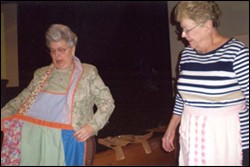Editor’s note: This is the 16th in a series of stories about congregations engaged in significant outreach and evangelism ministries, reflecting the General Assembly’s commitment to “Grow Christ’s Church Deep and Wide.” — Jerry L. Van Marter
Unable to afford expensive outside help, many caregivers fill their days or years tending to a beloved relative. Hobbies are abandoned. Old friends lose touch or shy away. Church attendance dwindles.
Dallas’ NorthPark Presbyterian Church, in Grace Presbytery, is working to provide caregivers a few hours of personal time while keeping those with Alzheimer’s entertained.
The Casa de Vida (House of Life) outreach program, started in February 2007, had its beginnings in the church. Member Molly Stewart, a volunteer social worker, saw Alzheimer’s take hold of a friend’s husband.
In trying to help her friend find care, Stewart priced outside agencies and researched on the Internet, realizing that affordable, quality care is hard to find. She then counseled with the Rev. Sally Brown, associate pastor at NorthPark, who pushed her to address the church’s session about how to reach out to other caregivers.
Going beyond church walls into the wider community is key to the 218th General Assembly’s commitment to grow Christ’s church deep and wide through evangelism, discipleship, servanthood and diversity.
Stewart talked with the NorthPark session about her idea for a low-cost non-sectarian program that would give caregivers respite while coordinating trained volunteers who would conduct fun activities with participants.
Session approved the idea, providing Stewart with a grant to get started. A family from the church also provided a memorial donation. That left her to find volunteers to staff Casa de Vida, which is open once a week for four hours.
Sitting at one of the session meetings was member Ann Anderson, whose father has Alzheimer’s and had come to visit while Anderson’s sister, his primary caregiver, sold his house and shopped for a nursing home. Seeing her father on a daily basis made her realize the strain her sister had endured. Anderson became the first volunteer in a program that still existed only on paper.
About a year after session approved Casa de Vida, the program was ready to open its doors. And it was met with praise from its first participants, who appreciated having a space where they felt comfortable.
Gordy, one of Casa’s first arrivals on opening day in February 2007, held his wife’s hand and announced, “Look ... no stairs to climb!”
Ed, another participant, looked around and exclaimed, “Everyone here is just like me!”
Caregivers also appreciated Casa de Vida right from the start.
A woman who returned for her husband later in the day said she’d been able to organize a closet alone in the quiet house.
“Before Casa de Vida, my activities grew less and less. Friendships dwindled. The first week (my husband was at Casa de Vida), I cleaned the house. The second week, I went shopping, bought things I didn’t need. The third week, I met old friends,” said one woman whose husband attends Casa de Vida.
Volunteers are the head of the program. Participants are each assigned a faith companion, who serves as a friend to guide them to various activities such as yoga chair exercises, crafts, music, memory games, beach-ball boogie or plastic bat baseball.
For those too shy to speak, Casa’s “sing-song lady,” Maria Bellantoni, uses music as the great communicator, playing the piano while volunteer Bill Williams leads singalongs.
Participants are asked to pay $10 to cover supplies and snacks, but no one is turned away because of inability to pay. Participants also are screened; people must be continent, nonviolent and ambulatory to attend Casa de Vida.
Volunteers also go through a process before signing on. They attend training conducted by outside groups like the Greater Dallas Alzheimer’s Association and Faith Presbyterian Hospice. These workshops introduce volunteers to activities, share advice on how to handle problems and speak about any innovations in Alzheimer’s research.
Now, there are about 30 active volunteers for Casa’s 12-15 participants — the ideal ratio. Volunteers who aren’t comfortable in one-on-one roles with participants can contribute in other ways.
“We don’t let them get away. We invent jobs,” Stewart said.
One such person is now Casa’s supply shopper and another decorates Fellowship Hall for any occasion each week. Two of the volunteer greeters are Bob Parker and Carl Rogers, ages 81 and 93, respectively.
Churches moving toward their own chapters are advised to start with plenty of prayer. Other key advice is to be patient and work as a team. Three other area churches, of varying denominations, plan to start similar outreach programs in the fall.
Advisory board members are Diana Cheney, co-director; the Rev. Sally Brown; Holly Daiker, Betty Reaves, Rita Wilson and Bill Goode.
To set up a presentation, contact Diana Cheney at (972) 926-7814.
Mary Louise Natho is a member of NorthPark Presbyterian Church in Dallas.

